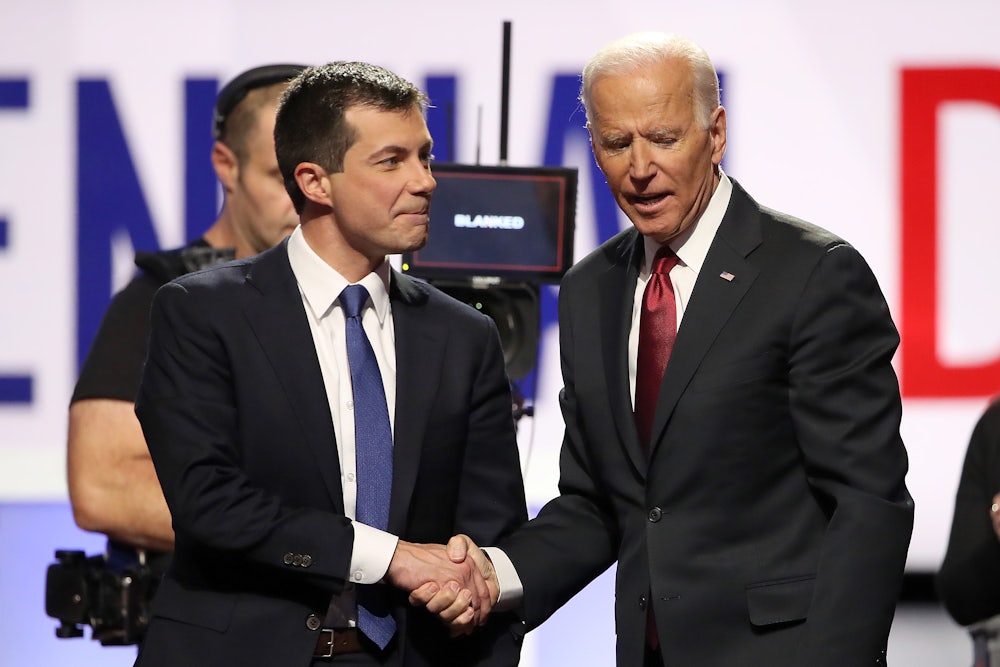Pete Buttigieg’s surge in the polls—if you can call rocketing to fourth place in Iowa a “surge”—has been built on a simple narrative: He alone can unite a divided country. Buttigieg has warned Democrats that identity politics and the ambitious domestic policy agenda of his rivals risk further tearing the country apart. “Our country will be horrifyingly polarized, even more than now ... after everything we are about to go through,” he said at the Democratic debate earlier this month.
Buttigieg’s bold idea is really one of the oldest in politics. Like Barack Obama before him, he is selling a dream of “unity,” which is what makes him a recognizable, almost nostalgic figure to both establishment Democrats and the Obama-era operatives who now grace the green rooms of CNN and MSNBC. Never mind that Obama himself spent much of his administration being stymied by a Republican opposition that understood the politics of polarization better than he did, or that Obama’s successor rose to power by questioning his American citizenship and playing the politics of division. In this hyper-partisan moment, “unity” is a curiously resilient aspiration—one that lives on in large part thanks to the punditocracy.
As a trope, “unity” can look a lot like naked ideology masquerading as pragmatism. Writing about Elizabeth Warren’s debate performance, for example, Slate’s William Saletan wondered if the candidate’s “extremism” will doom her candidacy—unless, upon winning the nomination, she softens her position on Medicare for All and rebrands “herself as a sensible progressive who can unite the country.” It’s odd how calls for unity so often coincide with calls for market-driven centrism.
Then there’s the bad faith unity argument propagated by the right. Assessing the Democratic Party’s presidential field, former George W. Bush strategist Karl Rove mused that “it’s difficult to unite a country while also accusing it of being led and dominated by white bigots.” Here, unity is trotted out as a shield as part of Karl Rove’s cynical effort to stop Democrats from pointing out the obvious fact that Donald Trump’s party is really racist.
But perhaps the most egregious paeans to unity come from those who seem to naively believe that voters in this country can actually be united. Here’s The New York Times’s Frank Bruni, an early Buttigieg cheerleader, on the appeal of South Bend’s mayor:
Few of [his] rivals grapple as persuasively as he does with what’s on the line in this election: not just the need to prevent four more years of Trump but also the need to pull America out of its partisan death spiral and rediscover the common ground, civic grace, and cultural glue that have been lost.
This is spoken like a man who has not been following politics for the last decade. While majorities, even super-majorities, of voters agree on certain issues, such as raising taxes on the very rich, American politics in recent years has been dominated by in-group/out-group dynamics, not to mention widespread resentment of fastidiously groomed elites like Buttigieg, who went to Harvard and worked at McKinsey. It seems vanishingly unlikely that any candidate for the Democratic nomination can create the kind of unity that Buttigieg is selling, particularly when Buttigieg himself has struggled to attract Democratic constituents other than big-money donors and educated white liberals.
Who are so many in the media reluctant to accept this basic reality? One reason is that appeals for unity have the benefit of reminding readers that members of the media do not play for any team (besides Team America, naturally). There’s the pundit’s desire to appear authentic as well, with “unity” standing in for some deeper understanding of the wants and needs of people in “the heartland.”
Most importantly, calls to “bring the country together” are a way of covering up discomfort with proposals that reek too strongly of any ideology other than the center-left liberalism that drove Democratic politics for decades. Despite the fact that Bernie Sanders and Elizabeth Warren have galvanized new voters with their rejection of Third Way politics, pundits insist that candidates must moderate their stances. It is an approach, they insist, that will result in the country magically coming together—despite the fact that there is no evidence that the more modest proposals of Barack Obama, a far more charismatic politician than Buttigieg, did any such thing.
